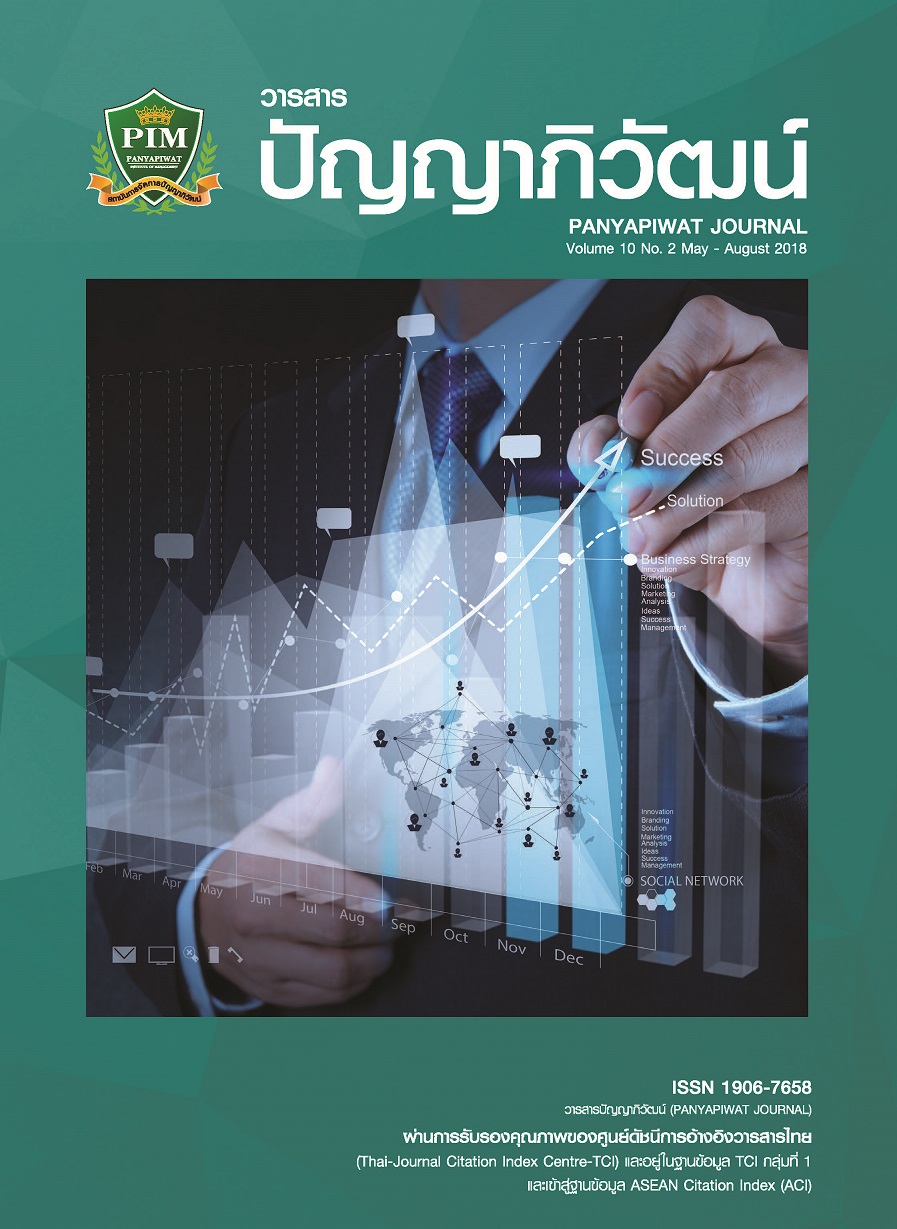การเปลี่ยนแปลงระบบการประเมินผลการปฏิบัติงานกับผลการปฏิบัติงานของพนักงาน: กรณีศึกษา บริษัทธุรกิจครอบครัว
Main Article Content
บทคัดย่อ
การวิจัยครั้งนี้มีวัตถุประสงค์ 1) เพื่อศึกษาการเปลี่ยนแปลงระบบการประเมินผลการปฏิบัติงาน 2) การเปลี่ยนแปลงของผลการปฏิบัติงานของพนักงานที่เกิดจากการนำระบบการประเมินผลการปฏิบัติงานแบบใหม่มาใช้ และ 3) ความคิดเห็นต่อระบบการประเมินผลการปฏิบัติงานระบบเดิมและระบบใหม่ในบริษัทเอกชนที่เป็นธุรกิจครอบครัว กลุ่มตัวอย่างในการวิจัยคือ พนักงานที่มีอายุงานสองปีขึ้นไปจำนวน 38 คน เพื่อเปรียบเทียบผลการปฏิบัติงานที่เกิดขึ้น จากนั้นนำข้อมูลระดับความคิดเห็นจากแบบสอบถามมาวิเคราะห์ทางสถิติเพื่อทดสอบสมมติฐานด้วยการวิเคราะห์สัมประสิทธิ์สหสัมพันธ์แบบเพียร์สัน การทดสอบความแตกต่างระหว่างค่าเฉลี่ย และการวิเคราะห์การถดถอย ผลการวิจัยพบว่า ระดับความคิดเห็นเกี่ยวกับระบบการประเมินและบริหารผลการปฏิบัติงานไม่มีความสัมพันธ์กับผลการปฏิบัติงานที่ระดับนัยสำคัญทางสถิติ 0.05 จากนั้นสัมภาษณ์เชิงลึกกับผู้ให้ข้อมูล 8 คน พบว่า ปัจจัยที่ส่งผลให้ผลการวิจัยไม่สอดคล้องกับการทบทวนวรรณกรรมและสมมติฐานที่ตั้งไว้ใน 5 ประเด็นคือ การอบรมระบบการประเมินและบริหาร
ผลการปฏิบัติงาน หลักเกณฑ์ที่ใช้ในระบบการบริหารผลการปฏิบัติงาน การนำผลการปฏิบัติงานไปบริหาร ด้านงานบุคคล การรับฟังความคิดเห็นจากพนักงาน และการให้ผลป้อนกลับ ซึ่งสะท้อนให้เห็นถึงแนวความคิดทางวชิ าการและการนำไปประยุกต์ใช้ในองค์การที่ยังขาดการสื่อสารที่ชัดเจน การให้ผลป้อนกลับ การปรับให้เข้ากับวัฒนธรรมองค์การ และการบริหารการเปลี่ยนแปลง
Article Details
“ข้าพเจ้าและผู้เขียนร่วม (ถ้ามี) ขอรับรองว่า บทความที่เสนอมานี้ยังไม่เคยได้รับการตีพิมพ์และไม่ได้อยู่ระหว่างกระบวนการพิจารณาลงตีพิมพ์ในวารสารหรือแหล่งเผยแพร่อื่นใด ข้าพเจ้าและผู้เขียนร่วมยอมรับหลักเกณฑ์การพิจารณาต้นฉบับ ทั้งยินยอมให้กองบรรณาธิการมีสิทธิ์พิจารณาและตรวจแก้ต้นฉบับได้ตามที่เห็นสมควร พร้อมนี้ขอมอบลิขสิทธิ์บทความที่ได้รับการตีพิมพ์ให้แก่สถาบันการจัดการปัญญาภิวัฒน์หากมีการฟ้องร้องเรื่องการละเมิดลิขสิทธิ์เกี่ยวกับภาพ กราฟ ข้อความส่วนใดส่วนหนึ่งและ/หรือข้อคิดเห็นที่ปรากฏในบทความข้าพเจ้าและผู้เขียนร่วมยินยอมรับผิดชอบแต่เพียงฝ่ายเดียว”
References
Boice, D. F. & Kleiner, B. H. (1997). Designing effective performance appraisal systems. Work Study, 46(6), 197-201.
Caruth, D. L. & Humphreys, J. H. (2008). Performance appraisal: essential characteristics for strategic control. Measuring Business Excellence, 12(3), 24-32.
De Waal, A. A. (2010). Performance-driven behavior as the key to improved organizational performance. Measuring Business Excellence, 14(1), 79-95.
Deepa, E., Palaniswamy, R. & Kuppusamy S. (2014). Effect of performance appraisal system in organizational commitment, job satisfaction and productivity. Journal of Contemporary Management Research, 8(1), 72-82.
DeNisi, A. S. & Pritchard, R. D. (2006). Performance appraisal, performance management and improving individual performance: A motivational framework. Management & Organization Review, 2(2), 253-277.
Fletcher, C. (2001). Performance appraisal and management: The developing Research agenda. Journal of Occupational and Organizational Psychology, 74(4), 473-487.
Iqbal, M. Z., Akbar, S. & Budhwar, P. (2015). Effectiveness of performance appraisal: An integrated framework. International Journal of Management Reviews, 17(4), 510-533.
Kagaari, J., Munene, J. C. & Mpeera, N. J. (2010). Performance management practices, employee attitudes and managed performance. International Journal of Educational Management, 24(6), 507-530.
Muczyk, J. P. & Gable, M. (1987). Managing sales performance through a comprehensive performance appraisal system. Journal of Personal Selling & Sales Management, 7(1), 41-52.
Naiyaphan, A. (2008). Research design: quantitative, qualitative, and mixed methods approach.Bangkok: Chulalongkorn University Printing. [in Thai]
Phuwitayaphan, A. (2010). Performance Management System (PMS). Bangkok: HR Center. [in Thai]
Pritchard, R. D. & Payne, S. C. (2003). Performance management practices and motivation.The New Workplace: People, Technology and Organization: A Handbook and Guide to the Human Impact of Modern Working Practices.
Ratsameethammachot, S. (2010). The Effective Performance Appraisal Handbook. Bangkok: Thailand Productivity Institute. [in Thai]
Robert, B. (2002). Performance Management. Bangkok: Expernetbooks Printing. [in Thai]
Roberts, G. E. & Reed, T. (1996). Performance appraisal participation, goal setting and feedback. Review of Public Personal Administration, 16, 29.
Rumakom, P. (2008). Performance appraisal. Bangkok: Thammasat University. [in Thai]
Sangthong, N. (2008). Strategic Performance Management. Bangkok: SE-Education Printing. [in Thai]
Schneider, B., Hanges, P. J., Smith, D. B. & Salvaggio, A. N. (2003). Which comes first: employee attitudes or organizational financial and market performance? Journal of applied psychology, 88(5), 836.
Sharma, N. P., Sharma, T. & Agarwal, M. N. (2016). Measuring employee perception of performance management system effectiveness: Conceptualization and scale development. Employee Relations, 38(2), 224-247.
Sincharu, T. (2009). Data Analysis with SPSS (10th ed). Bangkok: Business R and D. [in Thai]

